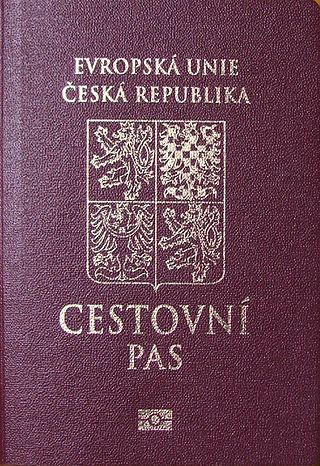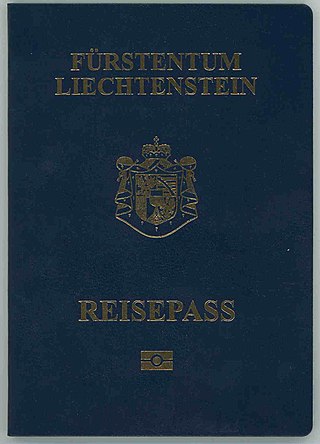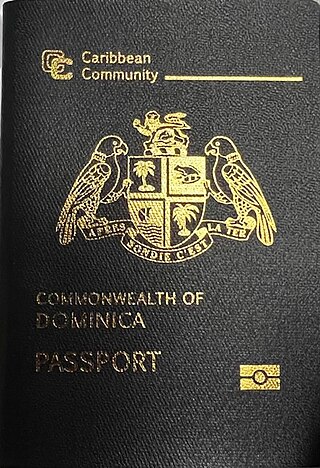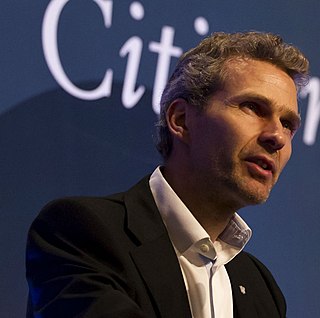
The visa policy of Australia deals with the requirements that a foreign national wishing to enter Australia must meet to obtain a visa, which is a permit to travel, to enter and remain in the country. A visa may also entitle the visa holder to other privileges, such as a right to work, study, etc. and may be subject to conditions.

The Czech passport is an international travel document issued to nationals of the Czech Republic, and may also serve as proof of Czech citizenship. Besides enabling the bearer to travel internationally and serving as indication of Czech citizenship, the passport facilitates the process of securing assistance from Czech consular officials abroad or other European Union member states in case a Czech consular is absent, if needed.

Turkish nationality law is based primarily on the principle of jus sanguinis. Children who are born to a Turkish mother or a Turkish father are Turkish citizens from birth. The intention to renounce Turkish citizenship is submitted in Turkey by a petition to the highest administrative official in the concerned person's place of residence, and when overseas to the Turkish consulate. Documents processed by these authorities are forwarded to the Ministry of Interior (Turkey) for appropriate action.
The Maltese passport is a passport that is issued to citizens of Malta. Every Maltese citizen is also a Commonwealth citizen and citizen of the European Union. The passport, along with the national identity card, allows for free rights of movement and residence in all member states of the European Economic Area, as well as Switzerland.

Cypriot passports are issued to citizens of Cyprus. Every Cypriot citizen is also a Commonwealth citizen and a citizen of the European Union. The Cypriot passport, along with the Cypriot identity card, allows for free right of movement and residence in any of the states of the European Union, European Economic Area, and Switzerland. As of July 2023, Cypriot citizens had visa-free or visa on arrival access to 179 countries and territories, ranking the Cypriot passport 12th in terms of travel freedom according to the Henley Passport Index. Cypriot citizens can live and work in any country within the EU as a result of the right of free movement and residence granted in Article 21 of the EU Treaty. The Republic of Cyprus was formed in 1960. All persons who were citizens of the Republic of Cyprus at this time are entitled to renew their citizenship and passport, whether living on the island or abroad within the diaspora. Their descendants, whether living on the island or abroad, are equally entitled to obtain Cypriot citizenship and passport. These citizens include the Greek and Turkish people, as well as the much smaller communities of Jewish and Armenian heritage.

The Montenegrin passport is the primary document for international travel issued by Montenegro.

Liechtenstein passports are issued to nationals of Liechtenstein for the purpose of international travel. Beside serving as proof of Liechtenstein citizenship, they facilitate the process of securing assistance from Liechtenstein consular officials abroad.

An Austrian passport is an identity document issued to citizens of Austria to facilitate international travel. Every Austrian citizen is also a citizen of the European Union. The passport, along with the national identity card, allows for free rights of movement and residence in any of the states of the European Economic Area and Switzerland.

The Haitian passport is issued to citizens of Haiti for international travel.

Commonwealth of Dominica (Dominican) passports are issued to citizens of Dominica for international travel. The passport is a CARICOM passport as Dominica is a member of the Caribbean Community. The Dominican government began issuing biometric passports to its citizens on 19 July 2021, having spent $13 million upgrading its passport system to improve national security across its borders.

The Saint Kitts and Nevis passport is issued to citizens of Saint Kitts and Nevis for international travel. Prior to 1983, Saint Kitts and Nevis, together with Anguilla, was an associated state of the United Kingdom. The passport is a Caricom passport as Saint Kitts and Nevis is a member of the Caribbean Community. As of 29 July 2023, citizens of Saint Kitts and Nevis had visa-free or visa on arrival access to 154 countries and territories.

The Vanuatu passport is an international travel document issued to Vanuatu citizens.
Immigrant investor programs are programs that allow individuals to more quickly obtain residence or citizenship of a country in return for making qualifying investments.

The Comorian passport is issued to citizens of the Union of the Comoros for international travel. As of 1 January 2017, Comorian citizens had visa-free or visa on arrival access to 48 countries and territories, ranking the Comorian passport 88th in terms of travel freedom according to the Henley visa restrictions index.
Economic citizenship can be used to represent both the economic contributions requisite to become a citizen as well as the role in which one's economic standing can influence his or her rights as a citizen. The relationship between economic participation and citizenship can be considered a contributing factor to increasing inequalities and unequal representation of different socioeconomic classes within a country.

Georgian nationality law is the organic law governing the acquisition, transmission and loss of Georgian citizenship.
The Henley Passport Index is a global ranking of countries according to the travel freedom allowed by those countries' ordinary passports for their citizens. It was launched in 2005 as Henley & Partners Visa Restrictions Index and was updated to Henley Passport Index in January 2018.
Henley & Partners is a British investment migration consultancy based in London. The company offers services to individuals and consults governments on residence and citizenship programs. In some cases, the company even runs the programs on behalf of governments. The company has pioneered the industry of selling citizenship and passports.

Christian H. Kälin or Kaelin is a Swiss businessperson, author, government advisor and lawyer who is the chairman of Henley & Partners, an architect of citizenship-by-investment programs that allow wealthy individuals to obtain additional passports.
Ron S. Geffner is an American attorney and former U.S. Securities and Exchange Commission enforcement lawyer. Geffner is a founding partner of Sadis & Goldberg, where he heads Financial Services Group providing legal counsel to over 800 funds including domestic and international financial institutions, family offices, hedge funds, venture capital and private equity funds. Geffner was previously in-house counsel to the Investment Management Industry Services Group of PricewaterhouseCoopers.















